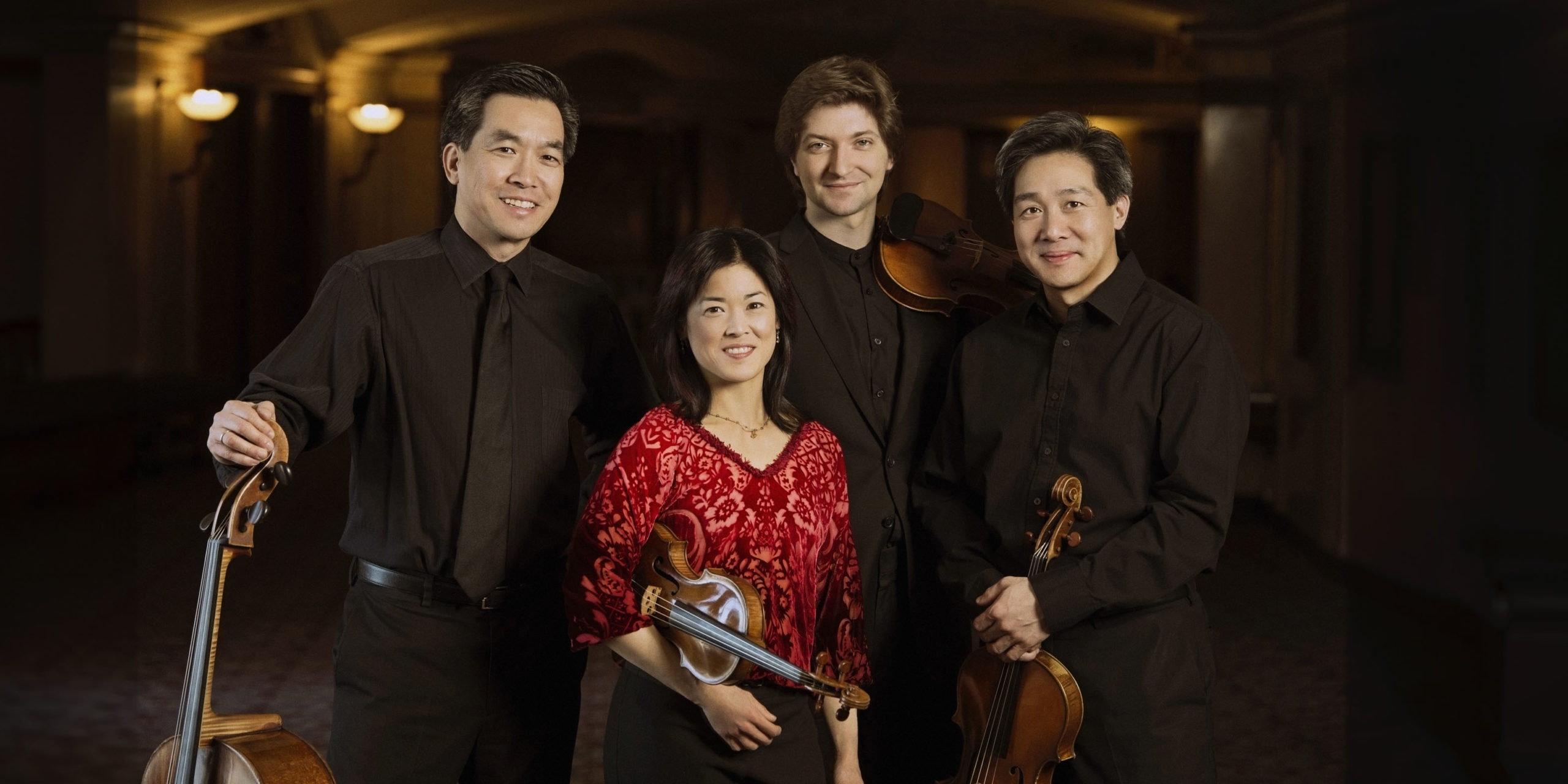The Ying Quartet’s next concert in the Eastman Ranlet Series will take place on Sunday, February 18, a few days after Valentine’s Day. But according to the ensemble’s cellist, David Ying, “there’s a clear Valentine’s Day theme although we’ll be a few days late!”
The concert program consists of two contemporary American works and a 19th-century classic by Johannes Brahms, but they are all tied together by one theme — romantic love. And, of course, by the musicians of the Ying Quartet: siblings David, cello; Janet, violin; and Phillip, viola; along with violinist Robin Scott.
For the first half, the Yings will play two works they commissioned from noted composers: Love Letters by Carter Pann ‘94E, and Anniversary Dances by Paul Moravec. Both are part of the quartet’s ongoing LifeMusic commission series, which has brought together American composers in many differing styles with one thing in common: to write a work for string quartet based on a subject from American life. The subjects have been as serious as the Columbine School shooting, and as relatively lighthearted as the two works they’ll be playing next Sunday.
Carter Pann based Love Letters on a teenage relationship of his own, and David Ying says audiences should find it completely relatable. “The movement depicts that initial crush, the overblown anxiety, the ups and downs of an adolescent relationship.” The movements include a “Prayer” (which David describes as “Will they like me? Please like me!”), a tango called “Limbo,” and one called “Passion,” indicated by rapidly shifting moods and keys. The music is eclectic in style, and David says it also shows the influence of pop music.
Written in 2002, Pann’s Love Letters has apparently found a sympathetic audience (the Yings’ recording of it is available on YouTube). David relates that a student he was interviewing for the summer chamber music class he and Phillip lead in Bowdoin, Maine, indicated they were “totally obsessed” with Love Letters and hoped to perform it that summer.
Paul Moravec’s Anniversary Dances replace adolescent romantic angst with mature married love. The Pulitzer Prize-winning composer wrote this string quartet to celebrate the wedding anniversary of his friends, John and Astrid Baumgardner. In fact, the Yings gave the first performance of Anniversary Dances in the Baumgardners’ living room in New York City. (Their recording is likewise available on YouTube.)
“Unlike Carter’s piece, Paul’s is not programmatic,” says David, “but it does convey his impressions of the Baumgardners as people.” He describes Moravec’s music as “eclectic, but more classical in style — no pop music influence. But the dance element is there in the lively rhythms.” He sums up Anniversary Dances as “a tapestry of energy and life and human emotions.”
The same phrase applies to the music on the second half of the program, in which the Yings will be joined by fellow Eastman faculty members: Associate Professor of Viola Masumi Per Rostad and Associate Professor of Orchestral Repertory Ahrin Kim (principal cellist of the Rochester Philharmonic Orchestra). Like many of Brahms’ pieces, the String Sextet in G major, Opus 36 was inspired by his rather shadowy love life. In this case, the inspiration was a woman to whom Brahms was engaged several years earlier, named Agathe von Siebold. In this case, David explains, Agathe’s inspiration is coded into the music.
“In the first movement of this sextet, Brahms uses the letters of her name as the notes A-G-A-B-E.” (In German, the letter “H” corresponds to the note “B”.) “At the climax of the movement, you hear her name repeated again and again by that motive. You can’t miss it!”
With its six string players and bottom-heavy scoring, this Brahms sextet is a somewhat unusual piece, but it’s a marvelous-sounding piece of chamber music. David Ying agrees that string players love to perform it, but also have to be careful not to love it too much. “It’s like a chocolate cake with pieces of chocolate in it and chocolate sauce on top…very, very rich! If you’re not careful about balance, it can be hard to know what part of the music you should focus on. With a piece like this, our rehearsals are often about taking things away and being careful to make every line in the music sound.”
The Eastman Ranlet Series presents the Ying Quartet, with violist Masumi Per Rostad and cellist Ahrin Kim, in music by Pann, Moravec, and Brahms on Sunday, February 18 at 3:00 p.m. in Kilbourn Hall. Tickets and more information available here.
